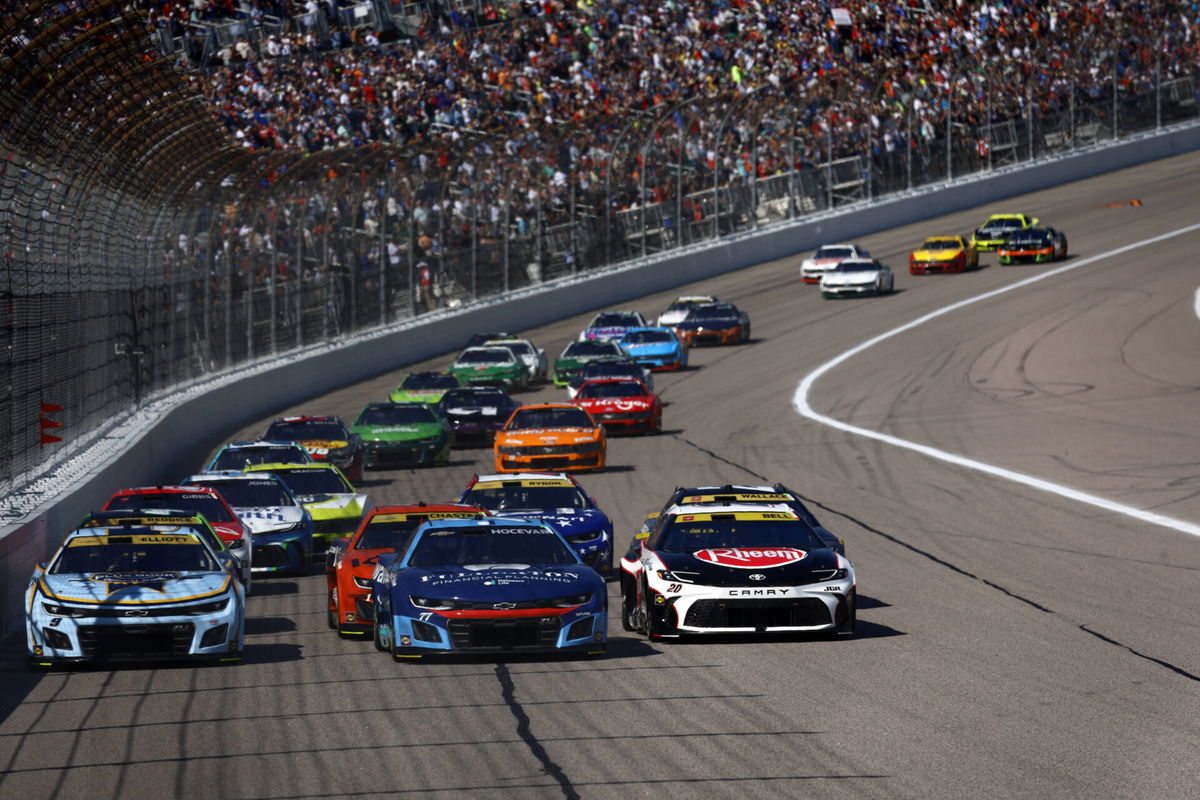
Imago
September 28, 2025, Kansas City, Ks, USA: CARSON HOCEVAR 77 of Portage, MI battles for position for the Hollywood Casino 400 Presented by ESPN BET in Kansas City, KS. Kansas City USA – ZUMAa161 20250928_aaa_a161_006 Copyright: xWalterxG.xArcexSr.x

Imago
September 28, 2025, Kansas City, Ks, USA: CARSON HOCEVAR 77 of Portage, MI battles for position for the Hollywood Casino 400 Presented by ESPN BET in Kansas City, KS. Kansas City USA – ZUMAa161 20250928_aaa_a161_006 Copyright: xWalterxG.xArcexSr.x

Imago
September 28, 2025, Kansas City, Ks, USA: CARSON HOCEVAR 77 of Portage, MI battles for position for the Hollywood Casino 400 Presented by ESPN BET in Kansas City, KS. Kansas City USA – ZUMAa161 20250928_aaa_a161_006 Copyright: xWalterxG.xArcexSr.x

Imago
September 28, 2025, Kansas City, Ks, USA: CARSON HOCEVAR 77 of Portage, MI battles for position for the Hollywood Casino 400 Presented by ESPN BET in Kansas City, KS. Kansas City USA – ZUMAa161 20250928_aaa_a161_006 Copyright: xWalterxG.xArcexSr.x
Watch What’s Trending Now!
NASCAR’s playoff format has been a lightning rod for debate ever since it was introduced in 2014. Designed to bring more drama and unpredictability to the sport’s championship fight, the system turns the final stretch of the season into a knockout-style battle. Here, one bad race can crush a season’s worth of hard work. Fans and purists have long argued that it undermines consistency, rewarding late-season luck over year-long dominance.
Yet, for every critic calling for a return to the old points system, there’s a growing camp that believes the playoffs are what make modern NASCAR so thrilling. After all, without them, would anyone really care who’s fighting for the final playoff place with just a few races left on the calendar?
The NASCAR playoffs deliver drama that no other points system ever could
NASCAR veteran Kenny Wallace is unapologetic in his defense of the playoff system, highlighting the electrifying spectacle it creates for fans. Reacting after Sunday’s Bank of America Roval 400, Wallace admitted, “I’m stuttering because the race was so damn exciting yesterday, and if we don’t have the playoffs, we don’t have those moments.”
Ken Schrader echoed this, emphasizing the tire falloff at Charlotte: “The tire falloff was amazing. It was like a Formula 1 race. We gotta 2-stop this? Are we gonna 3-stop this?” This drastic tire degradation forced drivers, including winner Shane van Gisbergen and rivals like Kyle Larson, to rethink strategies lap-by-lap, creating multiple pit cycles and a thrilling, unpredictable finish.
Despite the thrilling Roval drama, critics continue to question the fairness of NASCAR’s playoff format. Prominent drivers like Christopher Bell and veterans such as Dale Earnhardt Jr. have suggested rewarding season-long excellence rather than relying on a single finale. “I’ve been very vocal about taking as many as we can get. I think that 36 races or full points for the entire year is the way to go,” Bell famously said.
Yet the playoff system’s ability to inject suspense deep into the field was on full display at Charlotte, as Schrader described, “The playoffs get decided on for eighth place… Logano and Chastain they’re racing for eighth place. Who in the hell would give a crap about eighth place … if it wasn’t for the playoffs?”
View this post on Instagram
On the final lap at the Charlotte Roval, Joey Logano and Ross Chastain were tied for the last Round of 8 playoff spot, with Logano holding the tiebreaker. In a desperate move, Chastain collided with Denny Hamlin, spinning wildly across the finish line in reverse. Logano surged past to edge Chastain by just four points, clinching his advancement in dramatic fashion.
In the end, Wallace argues, the playoffs are delivering drama, strategy, and significance for every position. They turn average Sundays into unforgettable showdowns that keep NASCAR fans glued to their screens. And that’s what the sport needs.
Christopher Bell’s honest feedback sparks NASCAR playoff reform
NASCAR President Steve O’Donnell has revealed that a key turning point in the playoff format debate came from private conversations with Christopher Bell. While the playoff system had long faced vocal criticism, with many drivers and industry veterans calling for a return to a full-season championship model, it was Bell’s straightforward, behind-the-scenes candor that finally pushed NASCAR leadership to reconsider the current “winner-take-all” finale.
Bell, known for his calm demeanor and on-track consistency, didn’t take to social media to vent his worries. Instead, O’Donnell recalled, “He just gives me an honest opinion, which I agree with, of, ‘Hey, man, if I roll off 10 wins in a year, and I go to one race and a couple other guys get into me or whatever, I’m not the champion.’ Four years in a row, that happens.”
O’Donnell emphasized that Bell’s point wasn’t just personal disappointment—it was about the message sent to the next generation of racers. Would a burgeoning driver with long-term dominance in sight chase a NASCAR title, knowing it could all come undone in one race by circumstances beyond their control?
As a result, O’Donnell and NASCAR convened a committee of insiders and experts to discuss whether to keep or replace the elimination-style format. Many committee members now lean toward a modified system that would reward excellence throughout the entire season, echoing Bell’s concerns.
While the final structure is still undecided, the change is expected after the 2025 season, as O’Donnell pledged, “Whoever wins that championship, I’m going to stand behind that driver and team and say that’s our champion.” Christopher Bell’s ability to offer constructive, honest feedback in private (rather than grandstanding) resonated at the highest levels, setting the course for a potentially fundamental transformation of NASCAR’s postseason.


